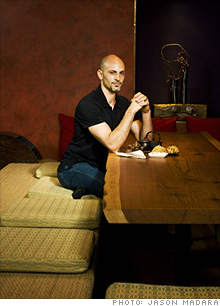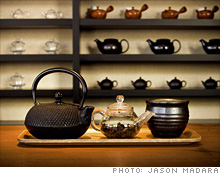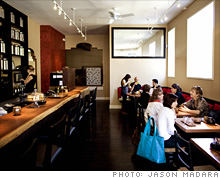Tea cozy
With help from his friends, an entrepreneur creates spaces for lingering.
 |
| Samovar founder Jesse Jacobs at a fallen redwood table in his store's Hayes Valley outpost. |

 |
| Samovar just before the lunch rush. |
(Fortune Small Business) -- At Samovar Tea Lounge, a chain of three teahouses in San Francisco, you'll find no wireless Internet or bulletin board littered with local news and advertisements.
"The goal is to create relationships with customers where they become guests -- or friends," says CEO Jesse Jacobs, a dot-com veteran who opened the first Samovar, in the Castro/Mission district during the 2001 tech crash. "Our design reflects that. We try to provide a cocoon from the outside world, so we need more than just a few chairs and a Formica countertop."
Seating space at the teahouse's bamboo tables is intentionally tight. Jacobs, who built his shops without consulting professional designers, says the setup encourages patrons to mingle and try menu items that beckon from neighbors' plates.
"It's easy to overhear conversations, but that's good," says copywriter Paul Tootalian, 42, a regular customer. "There's a real community feel."
Jacobs, 38, wanted to re-create the physical closeness he experienced as a child when his family gathered around his great-grandmother's samovar, a traditional tea vessel that looms large in Eastern European social life. Jacobs hosts Friday tea tastings at his Yerba Buena and Hayes Valley locations. In Hayes Valley they're held at the bar, a 20-foot-long slice of wind-fallen redwood installed by woodworker and friend Michael Deakin. The craftsman gave Jacobs a 40% discount in exchange for $1,000 worth of Samovar gift cards, which he distributed to his VIP customers -- generating marketing for both businesses. And the inexpensive repurposed wood fits with Samovar's aesthetic, which is based on wabi-sabi, a Japanese concept that finds beauty in simplicity, age and imperfection.
Resisting chain-store uniformity, Jacobs tries to match each Samovar to its neighborhood. When city officials asked him to help revitalize a dreary business district by setting up shop in Yerba Buena Gardens, he turned a failed Starbucks into a clean, modern space for business lunches, eliminating the candles, flowers and menu cards that typically clutter caf tables.
The independent design route spared Samovar from a cookie-cutter look, Jacobs says. And bartering with friends like Deakin helped him shave hundreds of thousands of dollars off construction costs, which totaled $1.2 million.
Revenues have doubled every year since Samovar launched and are expected to hit $3 million in 2009, all with no paid advertising. Jacobs estimates that word of mouth accounts for 95% of sales. When a restaurant conglomerate approached him recently to discuss franchising the Samovar concept, Jacobs passed.
"We don't think like a franchise," he says. ![]()
-
The Cheesecake Factory created smaller portions to survive the downturn. Play
-
A breeder of award-winning marijuana seeds is following the money and heading to the U.S. More
-
Most small businesses die within five years, but Amish businesses have a survival rate north of 90%. More
-
The 10 most popular franchise brands over the past decade -- and their failure rates. More
-
These firms are the last left in America making iconic products now in their twilight. More








